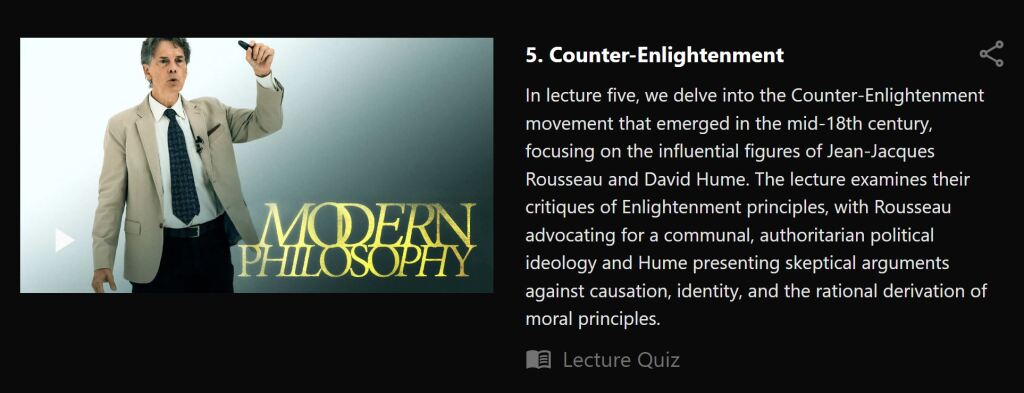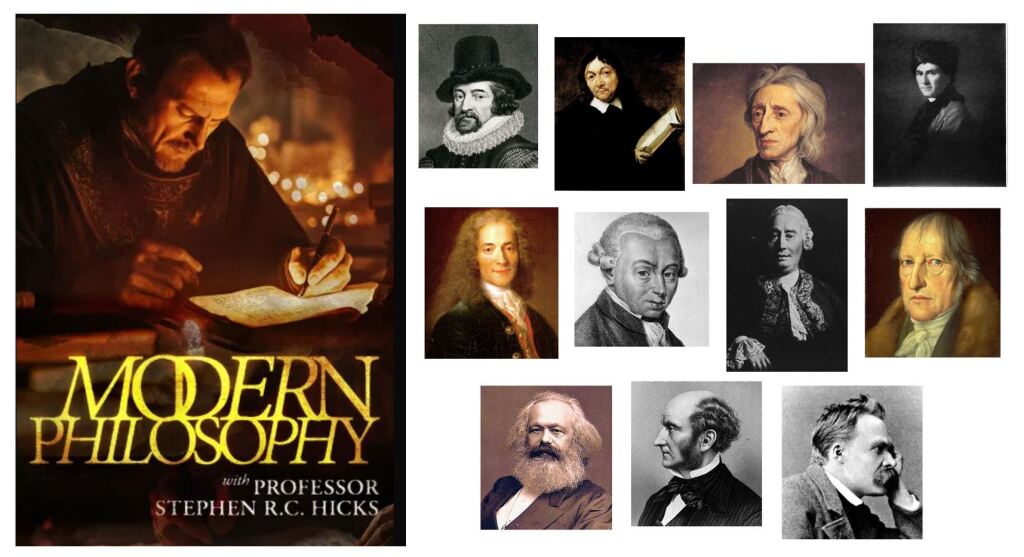“Nothing but the most determined scepticism, along with a great degree of indolence, can justify this aversion to metaphysics.”
Lecture Five: Counter-Enlightenment. David Hume and Jean-Jacques Rousseau

Themes: Skepticism, Passions, Fideism. Critiquing the Enlightenment. French Revolution. Lafayette. Voltaire. de Gouges. Robespierre. Texts: Hume: A Treatise on Human Nature. Rousseau: Discourse on Inequality.
About the Instructor
Stephen R. C. Hicks, Ph.D., has been Professor of Philosophy at Rockford University, Illinois; Visiting Professor of Business Ethics at Georgetown University, Washington, D.C.; Visiting Professor at the University of Kasimir the Great, Poland; Visiting Fellow at Harris Manchester College of Oxford University; and Visiting Professor at the Jagiellonian University, Poland.
In 2010, he won his university’s Excellence in Teaching Award.
Dr. Hicks is author of Explaining Postmodernism: Skepticism and Socialism from Rousseau to Foucault, Nietzsche and the Nazis, Entrepreneurial Living, Liberalism Pro and Con, and Eight Philosophies of Education. He has published in Business Ethics Quarterly, Review of Metaphysics, and The Wall Street Journal. His writings have been translated into twenty languages.

About the Course
In this eight-lecture course, Professor Stephen Hicks guides us through the Enlightenment and the Counter-Enlightenment, including philosophers Francis Bacon, René Descartes, John Locke, Voltaire, David Hume, Jean-Jacques Rousseau, Immanuel Kant, Georg Hegel, Karl Marx, John Stuart Mill, and Friedrich Nietzsche. For each, Dr. Hicks establishes the philosopher’s context, presents his or her most influential arguments, and quotes directly from the philosopher’s important works.


Course trailer and enrollment options at the Peterson Academy site. Professor Hicks’s other courses — Postmodern Philosophy, Philosophy of Politics: From the French Revolution to World War II, Philosophy of Politics: From the Cold War to After 9/11, and Modern Ethics — are coming soon to Peterson Academy.
“Nothing but the most determined scepticism, along with a great degree of indolence, can justify this aversion to metaphysics.”
The aversion to metaphysics is the aversion of the human brain, in my opinion, generates metaphysics on its own. It is a phenomenon specific to the human brain. (If it exists in certain animals, it’s a guess,, we will not be able to know, because even if they could feel it, they would not be able to say it.) The fact is that when a human being looked at the stars for the first time, something happened in his brain that he did not control. Every child lying down in the grass to look at the starry night felt something inexplicable in him, something metaphysical, and that will never leave him throughout his life. He will never be able to forget this metaphysical moment. Then come the questions…
The rejection of metaphysics is nihilism, being able to lead to hatred of the being, in all that is strange about it, in all that it can feel strange in itself, while seeking answers, even if the answers are stupid, the fact is that the questions have been asked, in a totally natural way.
Metaphysics is a natural movement in human thought.
Best!
— “The discipline which considers realities entirely separate from matter and the pure activity of the intellect in act and of the intellect in potentiality, that which is raised to it by the fact of activity, all this they call theology, first philosophy and metaphysics, since it is situated beyond physical realities.” — Simplicius of Cilicia – Commentary on Aristotle’s Physics (translation from French: Google translate)
The quote is from Hume… I just discovered it, I thought it came from your thoughts. (A Treatise of Human Nature (1739-40 – In the introduction).
Best!
And good luck with the Peterson Academy
(I find it strange that we see him in a form of shadow in the first page.
And especially what is written there “Education, devoid of ideology.”
Education cannot be without ideology, any thought that is expressed is ideological (logic of ideas, discourse of ideas, “Ideology is therefore, etymologically, a discourse on ideas.”) There is ideological sectarianism, but that is not the same as ideology.
So it is either a mistake, or a lie. Peterson is a pure ideologue.
Best again!